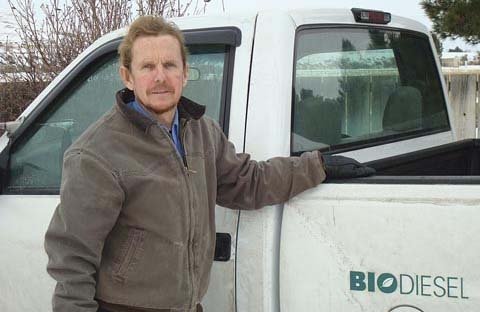
With all the talk about sustainability and the need to reduce the carbon footprint, orchardist Jim Baird wanted to do something in running his business that would have an impact now.
Baird has 200 acres of apples and row crops at Royal City, Washington, and has begun moving towards more sustainable and environmentally sound growing practices by using biodiesel in all his vehicles to reduce his fuel miles.
With all the complex information that’s published about the carbon footprint, it’s hard to know what to do and where to start making changes, he told growers at the Washington State Horticultural Association’s annual –convention in Wenatchee.
“We can feel almost paralyzed, but as I saw how simple this biodiesel was, I wanted to do something and do it now. I wanted to start making changes.”
He was inspired by a movement called Natural Steps that originated in Sweden. It encourages reduced dependence on fossil fuels and synthetic materials, and less encroachment on nature and natural ecosystems.
A start
He started out by buying a Volkswagen Golf and a Jetta that use soybean biodiesel. Last year, finding that the cars achieved more than 50 miles per gallon, with no apparent drawback, he decided to try using biodiesel in his tractors as well. He’s been using biodiesel from Central Washington Biodiesel in nearby Ellensburg and needed to make no modifications to the tractors other than changing the filters.
“I have tractors that are brand new, and some that are 12 years old,” he said. “I put it in everything.”
There’s been no noticeable difference in fuel economy or performance, and particulate emissions are reduced by 70 to 80 percent, he reported.
More efficient
Last year, he ran a mix of 80 percent biodiesel and 20 percent regular diesel, but it froze when the temperature dropped to 10°F. Now, he’s using a 50-50 mix.
The biodiesel is corrosive, however, and he has it delivered in plastic totes because he has an old diesel tank.
Biodiesel is not the same as ethanol that is used in gasoline vehicles, Baird stressed. Biodiesel is for diesel vehicles and is more efficient to produce than ethanol.
The biodiesel he uses is produced from crops such as canola and mustard that can be grown in Washington State. Biodiesel can be made from palm oil, but Baird said shipping palm oil from Malaysia does not fit with his idea of sustainability.
To further reduce his fuel miles, he planted more than 50 acres of canola last year. He’ll have it pressed at Natural Selection Farms in Yakima, and then Central Washington Biodiesel will process the oil into biodiesel. By using the resulting fuel on the farm, he’ll have a complete loop. He’ll grow the fuel, have it processed locally, and consume it himself.
Baird said that for every $1 spent on regular diesel, only about 10 cents stays in the local economy and the rest goes to oil companies and to some distant part of the country or the world where the oil originated.
“With biodiesel, the equation is exactly reversed,” he said. “The money stays here, in this area. It supports our local industry here.”
Baird encouraged other growers to join the effort to find solutions for making the tree fruit industry more –sustainable in the long term.
“I haven’t been this excited about orcharding for a long time—maybe since new varieties and high-density trellises came out,” he added. “It’s important we start aligning all of our growing practices with more natural systems.”

Leave A Comment